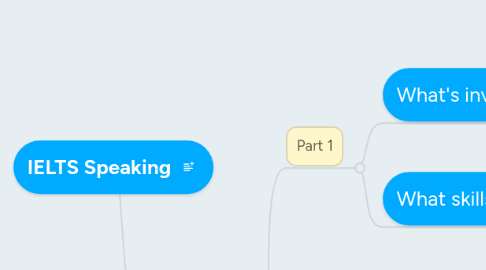
1. 3 parts
1.1. Part 1
1.1.1. What's involved?
1.1.1.1. In this part, the examiner introduces him/herself and checks your identity. Then the examiner asks you general questions on some familiar topics, such as home, family, work, studies or interests. Part 1 is 4–5 minutes long.
1.1.2. What skills are tested?
1.1.2.1. This part tests your ability to give opinions and information on everyday topics and common experiences or situations by answering a range of questions.
1.2. Part 2 – Long turn
1.2.1. What's involved?
1.2.1.1. Part 2 is the individual long turn. The examiner gives you a task card which asks you to talk about a particular topic. The card tells you what points you should include in your talk and instructs you to explain one aspect of the topic. You have one minute to prepare your talk, and the examiner will give you a pencil and paper to make notes. By using the points on the task card and making notes during the preparation time, you should be able to think of appropriate things to say, and have time to structure your talk so that you keep talking for 2 minutes. The examiner will then ask you to begin talking and will stop you when the time is up. They may then ask you one or two questions on the same topic. Part 2 lasts 3–4 minutes, including the preparation time.
1.2.2. What skills are tested?
1.2.2.1. This part tests your ability to speak at length on a given topic, using appropriate language and organising your ideas logically. You will need to think about your own experiences to complete the long turn.
1.3. Part 3 – Discussion
1.3.1. What's involved?
1.3.1.1. In Part 3, you and the examiner discuss issues related to the topic in Part 2 in a more general and abstract way and, where appropriate, in greater depth. Part 3 lasts 4–5 minutes.
1.3.2. What skills are tested?
1.3.2.1. This part tests your ability to explain your opinions and to analyse, discuss and speculate about issues.
2. Criteria
2.1. 4 assessment criteria
2.1.1. fluency & coherence
2.1.1.1. How well you speak at normal speed
2.1.1.1.1. minimal hesitation
2.1.1.2. Cohesion
2.1.1.3. linking words
2.1.1.4. Pronouns
2.1.1.5. Conjunctions
2.1.2. lexical resource
2.1.2.1. vocabulary range
2.1.2.2. accuracy
2.1.2.3. appropriacy
2.1.2.4. paraphrasing
2.1.3. grammatical range & accuracy
2.1.3.1. How varied your grammatical range is
2.1.3.2. Accuracy in grammatical use.
2.1.4. pronunciation
2.1.4.1. clarity
